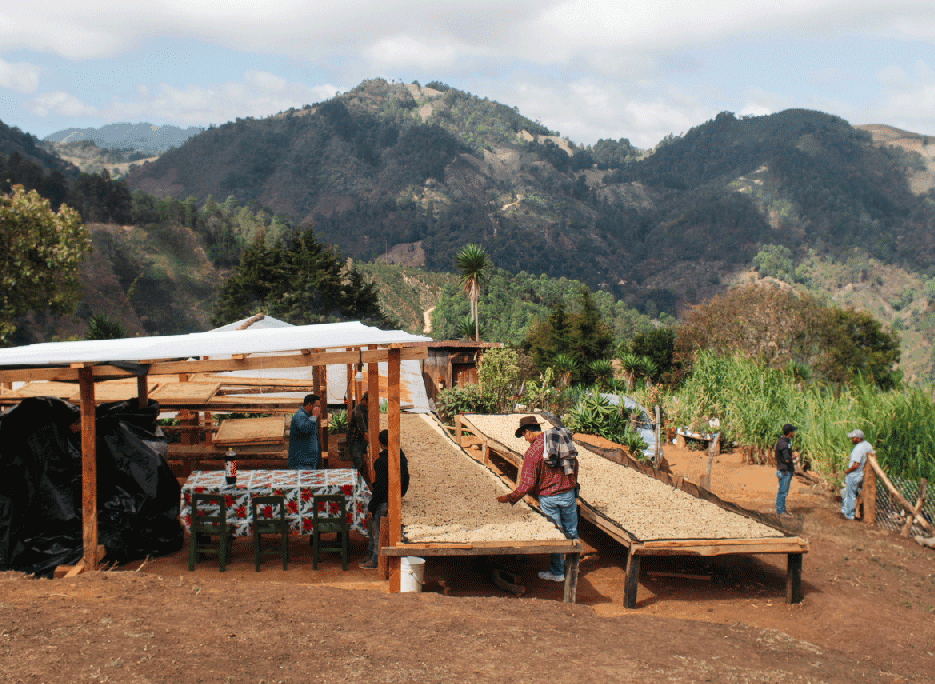It starts with a seed


Cafe Colis Resistencia
Guatemala
The producer group around Mataquescuintla - known locally as Cafe Colis Resistencia - face perhaps the most adversity of any of the four groups Semilla works with. We were first made aware of this group by Drew Johnson of Bows Coffee Roasters in Victoria who -- after reading about the trials faced by one of the group’s leaders Alex Reynoso -- pursued all channels possible to get in touch with them and lend support.
Quietly Built, Loudly Opposed
For the Indigenous Xinca, the Escobal silver mine looms in the background, both figuratively and literally. Owned and operated by the Canadian-based Pan-American Silver, it’s estimated to be the second-largest silver mine in the world, and was built without the consultation nor the consent of the local people, in direct contravention of the United Nations Declaration on the Rights of Indigenous Peoples (UNDRIP). Yet, at this moment, it sits shuttered, license temporarily suspended thanks to the organized actions of the Xinca people, who claim a long and storied history of resistance to colonization and infringement in their territories that dates back to the Conquest of Latin America. Canadian involvement in extractive projects in this area is well-documented and goes back at a minimum two decades. Escobal specifically was conceived in the late 2000s, and its potential existence was met by a series of local plebiscites and referendums held through 2011 and 2012. Due to its size, the profit a company stands to gain through this project is enormous, yet all the risk remains on the local people who must live with the guaranteed detrimental effects on the wellbeing of their families and the natural environment that sustains them. It makes sense then why all of these multiple plebiscites reported at minimum 93% opposition to the project by the local population. In the municipality where the mine was eventually built, San Rafael Las Flores, the plebiscite was blocked by municipal authorities, figures who have now been exposed as recipients of benefits from Esobal and its local subsidiary, Minera San Rafeal.
In this period, there were also a total of 280 complaints lodged with the Ministry of Energy and Mining stating that environmental impact testing had been insufficient. For example, in typical extractive licencing cases of this size, 5000 soil samples are expected to be taken to ensure harmful chemicals aren’t leaching into the soil. Soil samples taken and analyzed in the case of Escobal topped out at fourteen. Since then, multiple tests have shown elevated levels of arsenic in the water supply nearby the mine, while waters in the general area test as some of the cleanest in the country.
In December 2013, the Guatemalan Constitutional Court, in line with the United Nations Declaration on the Rights of Indigenous Peoples declared that it was mandatory for then-owner Tahoe Resources to complete similar consultations and receive community approval for the project. Despite this obvious and documented opposition, and with complete disregard to UN Convention, the mine was granted its license in 2013 and began functioning in 2014.
Gaining Traction, Maintaining Momentum
Their struggle has not gone unnoticed, however. In June 2017, the Guatemalan Constitutional Court sided with the Xinca Parliament, suspending Escobal’s licence pending proper consultations with the local people. In 2018, this was upheld by the country’s Supreme Court. The suspension of the license led to a plunge Tahoe Resources' stock, one so extreme the company had to sell the rights to Pan American Silver. Pan American, as one of the largest silver extracting companies in the world, is clear in their belief that they can ride out any opposition and that short term loss will be outweighed by the massive profit they can accrue through the functioning of the mine. They have already begun engaging in illegal and false consultations, attempting to drum up support for the mine to present to the court without the involvement of the Xinca Parliament. Kelvin Jimenez, coffee producer and lawyer who leads the Xinca Parliament explained that he feels heartened despite all of the challenges and struggles they have faced.
For one thing, their resistance to Escobal forced the Guatemala government to recognize the existence of the Xinca peoples, despite previously arguing they hadn’t existed. against this mine has led to the first official recognition of their people by the Guatemala constitution, which they had been fighting for since 1996.
In the early days of protest against the mine, the government released information to the press seeking the capture of the heads of the XInca parliament. This public admission of their existence meant they couldn’t be excluded from the census anymore and since then, the number of recorded XInca has grown from 16,000 to 240,000 in 2018.
The Xinca resistance also set a national legal precedent when the Constitutional Court and Supreme Court voted in their favour, giving them the distinction of being the Indigenous group responsible for setting a constitutional standard that any extractive project needs to go through a consultation process. Even Mayan peoples, who number over 50% of the total population of Guatemala, were unable to achieve this in the past.

